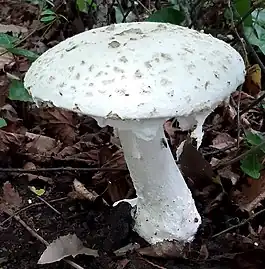| Amanita strobiliformis | |
|---|---|
 | |
| Scientific classification | |
| Domain: | Eukaryota |
| Kingdom: | Fungi |
| Division: | Basidiomycota |
| Class: | Agaricomycetes |
| Order: | Agaricales |
| Family: | Amanitaceae |
| Genus: | Amanita |
| Species: | A. strobiliformis |
| Binomial name | |
| Amanita strobiliformis (Paulet ex Vittad.) Bertill. | |
Amanita strobiliformis is a species of mushroom. It is commonly referred to as warted amanita.[1]
Description
The cap is 7.5 to 25.5 centimetres (3 to 10 inches) across, is rough with warts which sometimes fall away leaving the cap smooth, whitish, and sometimes has some brown. The gills are free and rounded behind. The veil is large and sometimes adhere to the margin of the cap. The stipe (stem) is 7.5 to 20 cm (3 to 8 in) long, thick, white, bulbous, and sometimes weighs a pound. The spores are elliptical.[2]
 A. strobiliformis
A. strobiliformis
Distribution and habitat
In Europe, A. strobiliformis grows from the Mediterranean region to the Netherlands and England, and maybe further north.[3]
It is associated mycorhizal with deciduous trees, preferring scattered forest, or woodland borders, usually on alkaline soil.[3][4] It grows singular fruits and sometimes clusters.[5] The fungus is rare.[6]
Toxicity
The edibility is unknown, but the genus Amanita contains some of the most toxic fungi known. Some amanitas are deadly in only very small doses, while others are relatively harmless and sometimes even considered fit for human consumption.
References
- ↑ "Standardized Common Names for Wild Species in Canada". National General Status Working Group. 2020.
- ↑ MclLVAINE, Charles; K. Macadam, Robert (1973). One Thousand American Fungi. Dover Publications, Inc. p. 19.
- 1 2 Amanita strobiliformis (Paulet ex Vittad.) Bertill. - Warted Amanita
- ↑ Amanita strobiliformis
- ↑ Taylor, Thomas (1897). Student's hand-book of mushrooms of America edible and poisonous, Issues 1-5. A. R. Taylor. p. 8.
- ↑ Joseph Berkeley, Miles (1860). Outlines of British fungology: containing characters of above a thousand species of Fungi, and a complete list of all that have been described as natives of the British Isles. L. Reeve. pp. 90.
Amanita strobiliformis.

.jpg.webp)